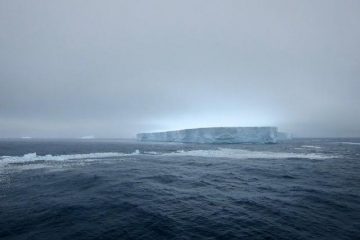
On June 2, a new study published on PNAS and led by professor Sonia Kreidenweis of Colorado State University showed that an atmospheric region in Southern Ocean is unchanged by human-related activities.
Human activities affect almost every corner of the earth. For example, garbage can be found in the most remote parts of the ocean, and plastic products used by humans are washed onto remote beaches where no one lives. However, Kreidenweis and her team studied the air over the Southern Ocean, a body of water south of Australia, and found no trace of human activity in the clouds there. According to the study, there is no trace of used fossil fuel, chemical fertilizer or human waste in that area. They suspect that it’s the cleanest air on earth.
The researchers took samples near the surface of the ocean and studied the composition of microbes found in the air, which provided clues about where the microbes had travelled in the air. They found that these microbes most likely originated from the ocean. “We were able to use the bacteria in the air over the Southern Ocean as a diagnostic tool to infer key properties of the lower atmosphere,” said research scientist Thomas Hill, coauthor on the study. “Overall, it suggests that the [Southern Ocean] is one of very few places on Earth that has been minimally affected by anthropogenic activities.” The distant Southern Ocean is far away from most parts of human civilization; therefore, it avoids most of the pollution caused by human activities.
Through analysis, it has been found that the air over the Southern Ocean is so clean that there was almost no DNA to work with. This is incredible, as the pollution on earth is causing severe climate change, and the opposite side of Antarctica has been seriously impacted.
Meanwhile, melting glaciers have caused the emergence of five islands in the Arctic, and the admiral in charge of the investigation states that plants, birds and bear-torn remains of seals have been found on the islands.
As the COVID-19 pandemic brings economies to a halt around the world, “I wouldn’t be shocked to see a 5 percent or more drop in carbon dioxide emissions this year, something not seen since the end of World War II,” said Rob Jackson, chairman of the Global Carbon Project (GCP) and a professor at Stanford University, “neither the fall of the Soviet Union nor the various oil or savings and loan crises of the past 50 years are likely to have affected emissions the way this crisis is.”
According to Jackson, the projected fall this year would be the first reduction in global carbon dioxide emissions since the financial crisis of 2008. However, the improvements were made by shutting down factories, cancelling flights and forcing billions of people to stay at home. Therefore, the improvement may only be momentary, and has little effect on the concentration of carbon dioxide accumulated in the atmosphere for decades.
It is a great news that the cleanest air has been discovered, but the world needs to take effective action to reduce pollution in the long term for this miracle to continue.